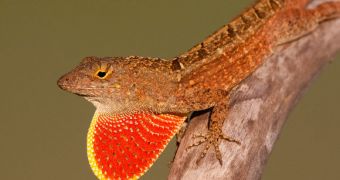A new investigation has revealed an interesting interaction between two evolutionary processes – natural selection and the founder effect. This has never been studied before in nature, but the phenomenon was discovered in a population of lizards living in a tiny island in the Bahamas.
The particular islands where evolutionary biologists released several lizards for their experiments were uninhabited, so no human interference was present during the study. The research group was led by University of Rhode Island (URI) biologist Jason Kolbe.
He worked closely together with colleagues at the Harvard University, the Duke University, and the University of California in Davis (UCD) for this investigation. The team leader learned that natural selection and the founder effect contributed to shaping the lizards' genetic and morphological features.
In a paper published in the latest online issue of the top journal Science, the group explains that the genetic legacy and structural appearance of the lizards are influenced not only by natural selection, the environment or predators.
They explain that the founder effect is a phenomenon through which genetic variations are lost in populations that are established in a new ecosystem by very few individuals of a particular species. This is what happened when researchers introduced only a small number of lizards of the islands.
When the founder effect runs its course, the newly-established population tends to become genetically or morphologically different from the original species in which it originated. “We rarely observe the founder effect as it happens in nature, but we know that it occurs because islands are colonized by new species over time,” Kolbe explains.
“What we didn't know was how these evolutionary mechanisms [natural selection and the founder effect] interact with each other,” the team leader goes on to say. His work was funded by the Division of Environmental Biology at the US National Science Foundation (NSF).
In addition to providing the first direct observations of the founder effect, the team was also able to obtain a wealth of data that will come in handy for settling a 70-year-old debate on the influence this effect has in nature.
“This study is the first to definitively demonstrate those effects for ecologically important traits,” DEB program director Sam Scheiner concludes.

 14 DAY TRIAL //
14 DAY TRIAL //